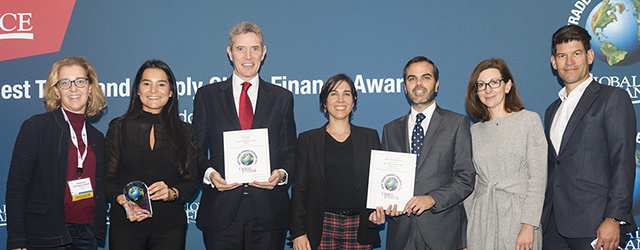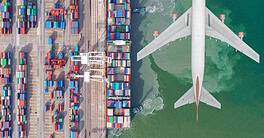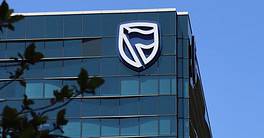Digitization is revolutionizing age-old processes at trade finance banks.

The leading trade finance banks are on the verge of transforming their industry from a paper-based system to a more efficient and transparent digitized model. This could help bankers amass the necessary resources to bridge the trade finance gap in emerging markets and, armed with transaction data, customize their trade offerings to better meet each customer’s individual needs.
“Data-led processing and technology will drive efficiencies and put more credit on the table,” says Samuel Mathew, managing director and global head of documentary trade-product management, transaction banking, at Standard Chartered Bank, in an essay on the bank’s website. Recent geopolitical developments are changing the landscape for lenders as well, he adds: “With trade finance linked to protectionism, the rise in nationalism and populism will drive a greater domestic and regional trade element in trade finance.”
The current trade spat between the US and China needs to be put into context, Mathew says. Global trade is currently worth about $16 trillion; trade between the US and China accounts for only 2% to 3% of the total, he points out. “The impact of protectionist tariffs, therefore, will be contained and relatively minor, unless an entity has a concentrated exposure to this corridor,” he says.
The Washington-Beijing standoff on trade finance volumes is likely to be minor as well, he argues. He advises banks to concentrate on harnessing the benefits of digitization. Just as the introduction of containerization lowered shipping costs and spurred a global boom in trade growth in the 1960s, “more effective and transparent use of technology and data [would] allow banks to tap into new flows,” Mathew says. “Armed with transactional data, banks can predict the trade-facilitation requirement of their clients and provide them with hyperpersonalized financing and risk mitigation on demand,” he says.
Along with Standard Chartered, seven other trade finance banks—Bangkok Bank, BNP Paribas, CTBC Holding, HSBC, ING, NatWest and SEB Group—have created a blockchain-based network, Voltron, for automating letters of credit and trade finance documents. Operating over R3’s Corda platform, Voltron is an open platform for documentary trade and is accepting additional banks and corporations. A transaction with Cargill last year involving a shipment of soybeans from Argentina to Malaysia demonstrated the viability of the platform.
“Today’s trade finance solutions were built in silos, adding significant risk, operational inefficiencies and costs into the process,” says David Rutter, CEO of R3, in a company press release. “Previous trades conducted on Voltron have demonstrated banks can offer a commercially and operationally viable blockchain solution with significant customer benefit.”
Global trade volumes have grown steadily since 2016; but some leading indicators are starting to point to a gradual “softening” of growth, according to Greenwich Associates. If that occurs, plenty of customers will still have a strong need for trade finance, says Gaurav Arora, head of corporate and institutional banking at the firm, in a company press release. “From the perspective of banks, a slowdown in global trade caused by geopolitical events would be at least partially offset by a growing need among large companies in Asia, Europe and the US for trade finance products and services that help mitigate mounting levels of sovereign and counterparty risks,” he says.
|
WORLD’S BEST TRADE FINANCE PROVIDERS 2019 |
|---|
GLOBAL WINNERS |
|
|---|---|
Category |
Bank |
| Best Bank for Trade Finance | BNP Paribas |
| Most Innovative Bank for Trade Finance | China Construction Bank |
| Best Bank for Commodity Finance | Rabobank |
| Best Bank for Export Finance | Standard Chartered Bank |
| Best Bank for Structured Trade Finance | Rand Merchant Bank |
| Best Bank for Trade Finance in Emerging Markets | Société Générale |
| Best Bank for Trade Finance in Frontier Markets | Citi |
REGIONAL WINNERS |
|
|---|---|
| North America | Citi |
| Latin America | Santander |
| Caribbean | Scotiabank |
| Western Europe | Commerzbank |
| Nordic Region | Nordea |
| Central & Eastern Europe | UniCredit |
| Asia-Pacific | Standard Chartered Bank |
| Middle East | Arab Bank |
| Africa | Société Générale |
COUNTRY WINNERS |
|
|---|---|
| Algeria | Société Générale Algerie |
| Angola | Standard Bank Angola |
| Argentina | Banco Santander Rio |
| Armenia | AraratBank |
| Australia | ANZ |
| Austria | Raiffeisen Bank International |
| Azerbaijan | Kapital Bank |
| Bahrain | Bank ABC |
| Bangladesh | Bank Asia |
| Belgium | KBC Bank |
| Bosnia & Herzegovina | UniCredit Bank |
| Botswana | RMB Botswana |
| Brazil | Itaú BBA |
| Bermuda | Bank of NT Butterfield & Son |
| Bolivia | Banco BISA |
| Botswana | First National Botswana |
| Brazil | Itaú Unibanco |
| Bulgaria | United Bulgarian Bank |
| Cambodia | Foreign Trade Bank of Cambodia |
| Cameroon | Société Générale Cameroun |
| Canada | Royal Bank of Canada |
| Chile | Banco Santander Chile |
| China | ICBC |
| Colombia | Banco de Bogota |
| Côte d’Ivorie | Société Générale de Banques en Côte d’Ivorie |
| Croatia | Zagrebacka banka |
| Cyprus | Alpha Bank Cyprus |
| Czech Republic | CSOB |
| Denmark | Sydbank |
| Egypt | Commercial International Bank |
| El Salvador | Banco Hipotecario |
| Estonia | Swedbank Estonia |
| Finland | Nordea |
| France | BNP Paribas |
| Georgia | TBC Bank |
| Germany | Deutsche Bank |
| Ghana | Zenith Bank |
| Greece | National Bank of Greece |
| Guatemala | Banco Industrial |
| Honduras | Banco Ficensa |
| Hong Kong | Standard Chartered Bank |
| Hungary | K&H Bank |
| India | State Bank of India |
| Indonesia | DBS Bank |
| Iraq | Trade Bank of Iraq |
| Israel | Bank Leumi |
| Italy | Intesa Sanpaolo |
| Japan | MUFG |
| Jordan | Arab Bank |
| Kazakhstan | Halyk Bank |
| Kenya | CfC Stanbic Bank |
| Kuwait | Kuwait Finance House |
| Latvia | SEB |
| Lebanon | BLOM Bank |
| Lithuania | Swedbank |
| Luxembourg | BGL BNP Paribas |
| Malaysia | CIMB Group |
| Malta | Bank of Valletta |
| Mauritius | Mauritius Commercial Bank |
| Mexico | Banorte |
| Mongolia | Khan Bank |
| Morocco | Arab Bank |
| Mozambique | Millennium bim |
| Nambia | Bank Windhoek |
| Netherlands | ING |
| New Zealand | ANZ |
| Nigeria | Zenith Bank |
| Norway | DNB Bank |
| Oman | Bank Muscat |
| Pakistan | Soneri Bank |
| Palestine | Bank of Palestine |
| Panama | Bladex |
| Peru | Banco Pichincha |
| Philippines | Bank of the Philippine Islands |
| Poland | PKO Bank Polski |
| Portugal | Novo Banco |
| Qatar | Doha Bank |
| Romania | BRD GroupeSociété Générale |
| Russia | Alfa-Bank |
| Saudi Arabia | Samba Financial Group |
| Senegal | FBN Bank Senegal |
| Serbia | Banco Intesa Beograd |
| Singapore | DBS Bank |
| Slovakia | Slovenska Sporitelna |
| South Africa | Standard Bank |
| South Korea | KEB Hana |
| Spain | Santander |
| Sweden | Handelsbanken |
| Switzerland | UBS |
| Taiwan | CTBC Bank |
| Thailand | Kasikornbank |
| Tunisia | Société Générale Tuisie (UIB) |
| Turkey | Garanti Bank |
| Ukraine | Raiffeisen Bank Aval |
| United Arab Emirates | Abu Dhabi Commercial Bank |
| United Kingdom | NatWest |
| United States | Citi |
| Uruguay | Banco Itaú Uruguay |
| Uzbekistan | Hamkorbank |
| Vietnam | VietinBank |
U.S. REGIONAL WINNERS |
|
|---|---|
| New England | Webster Bank |
| Mid-Atlantic | M&T Bank |
| Great Lakes | Huntington Bancshares |
| Plains | First National Bank of Omaha |
| Southeast | BB&T |
| Southwest | Cullen/Frost Bankers |
| Rocky Mountain | Zions Bancorp |
| Far West | U.S. Bancorp |
Methodology
Global Finance editors select the winners for both the Trade Finance Awards and Supply Chain Finance Awards with input from industry analysts, corporate executives and technology experts. The editors also use entries submitted by financial services providers, as well as independent research, to evaluate a series of objective and subjective factors. This year’s ratings, which covered 96 countries and nine regions, were based on performance during the period from the fourth quarter of 2017 through the third quarter of 2018.
It is not necessary to enter in order to win, but experience shows that the additional information supplied in an entry can increase the chance of success. In many cases, entrants are able to present details and insights that may not be readily available to the editors of Global Finance.
The winners are those banks and providers that best serve the specialized needs of corporations as they engage in cross-border trade. The winners are not always the biggest institutions, but rather the best—those with qualities that companies should look for when choosing a provider.
Global Finance uses a proprietary algorithm with criteria—such as knowledge of local conditions and customer needs, financial strength and safety, strategic relationships and governance, competitive pricing, capital investment and innovation in products and services—weighted for relative importance. Each entity is rated on each separate criterion. The algorithm incorporates those ratings into a single numerical score, with 100 equivalent to perfection. In cases where more than one institution earns the same score, we favor local providers over global institutions, and privately owned banks over government-owned ones.GLOBAL WINNERS
BEST BANK FOR TRADE FINANCE
BNP Paribas
Staffed by 350 multilingual trade experts, BNP Paribas’s more than 100 trade centers in 60 countries are set up to handle all trade-related needs of corporations. An additional 1,200 middle- and back-office employees complete the bank’s trade team. Altogether, BNP Paribas has a presence in 75 countries.
The bank’s clientele of more than 40,000 corporate clients in a wide range of industries—for whom it handles 14 million trade-related transactions annually—is a testament to its strength in trade finance. Its solutions include structured trade and supply chain management as well as web-based platforms. Centric, the bank’s digital client platform, provides access to all of its services, including trade finance, supply chain and cash management. BNP Paribas has been part of Voltron, the open platform for documentary trade, since its inception. It also has a partnership with Cashforce, a fintech, to offer digital cash flow forecasting and working-capital services to corporate treasurers
MOST INNOVATIVE BANK FOR TRADE FINANCE
China Construction Bank
Chinese banks are already conducting a large volume of trade finance transactions over blockchain platforms. China Construction Bank (CCB) says total transaction volume on its blockchain financing platform through last November totaled 200 trillion renminbi ($28.9 trillion), including domestic letters of credit, forfeiting and international factoring. Some 67 financial institutions in 16 countries have signed agreements to conduct business on CCB’s platform. CCB is also participating in a new blockchain platform recently announced by the People’s Bank of China, which will connect Guangdong, Hong Kong and Macau for activities such as trade financing and funds transfer. CCB is also using blockchain technology to ensure that rural migrant workers in Guangdong province are paid in full and on time.
BEST BANK FOR COMMODITY FINANCE
Rabobank
Rabobank of the Netherlands is a global leader in food and agriculture financing. It confirms and discounts export letters of credit totaling about $60 billion annually. As a cooperative lender, it follows its clients to wherever they need local support in both trade and commodities. Rabobank has in-depth knowledge of trade flows and commodity supply chains. This expertise is embedded in a global branch network. Through its structured inventory products, Rabobank provides ownership-based financing solutions as an alternative to regular financing. This enables the borrower to sell precious metals for cash, with the option to repurchase any amount of the metals at a later date.
BEST TRADE DOCUMENT MANAGEMENT
BNY Mellon
BNY Mellon processes trade documents worldwide through a broad branch network, using scanning and digitization to deliver trade documents between exporters, importers and their bankers. BNY Mellon’s overnight document-examination service for import and export letters of credit enables clients to improve their turnaround times, reduce costs and add processing capacity when existing examiners’ resources are strained. It is also working on a proof of concept for the use of artificial intelligence (AI) for trade sanction filtering, and testing the harnessing of AI and robotics to read trade documents in a structured format and feed the information into its compliance system.
BEST BANK FOR EXPORT FINANCE
Standard Chartered Bank
Trade Finance is a StanChart specialty: The bank has 5,000 trade professionals globally and serves nearly 40,000 suppliers. Looking at the year ahead, a trade war between the US and China would have minimal impact on its business, the bank says, because less than 1% of its revenues are directly related to this trade corridor. In fact, it could benefit from increased trade by China with its neighbors and with Africa. Showcasing its forward-thinking approach to export finance, the bank has been urging UK exporters,and EU-based companies that export to the UK, to look more widely for growth in exports to mitigate potential export shrinkage post-Brexit. In particular, the UK is missing out on more than $12 billion worth of exports annually to what StanChart calls the Emerging 7 (E7) countries: China, India, Pakistan, Nigeria, Bangladesh, Vietnam and Indonesia.
BEST BANK FOR STRUCTURED TRADE FINANCE
Rand Merchant Bank
The structured trade and commodities team at South Africa’s Rand Merchant Bank works with CFOs and corporate treasurers to design bespoke structured-lending solutions for corporations looking to enhance their working capital. RMB is present in 12 African countries, has access through FirstRand Group to a bank network covering 25 countries across the continent, and claims a deep understanding of the markets in which it operates. Its financing of Safex (South African Futures Exchange) deliverable commodities enables the seamless provision of liquidity facilities. RMB is also a leader in metals-financing capabilities, particularly in gold. Its traditional trade team includes a Johannesburg hub with subsidiary networks elsewhere in Africa and India.
BEST BANK FOR TRADE FINANCE IN EMERGING MARKETS
Societe Generale
Societe Generale has trade experts on the ground in 51 countries, including 19 in Africa and 13 in Central and Eastern Europe. Its 3.7 million African clients include 150,000 corporations. Through subsidiary Komercni banka, it is the third-largest bank in the Czech Republic; and it is among the top banks in Romania and Russia, where it is the majority shareholder in Rosbank. SG is also pushing digital boundaries as a member of the we.trade consortium, founded in 2018 and with a dozen members today, which seeks to simplify trade finance using blockchain technologies.
BEST BANK FOR TRADE FINANCE IN FRONTIER MARKETS
Citi
Citi’s Treasury and Trade Solutions provides integrated cash management and trade finance services not only to major players in major markets, but around the globe. It continues to extend its offering to new geographies and has boosted investment in technology to support trade innovation. Last July, Citi and International Finance Corp. extended a $1.2 billion risk-sharing facility, originally launched in 2009, to help stimulate growth of trade in emerging markets and support economic development. Thus far, these efforts have financed $29 billion worth of trade, with about $4.5 billion in countries served by the International Development Association, the World Bank’s fund for the poorest countries, and more than $11 billion in low income and lower-middle-income countries.
|
REGIONAL WINNERS |
|---|
NORTH AMERICA
Citi
Trade financing begins at home, and Citi’s Treasury and Trade Solutions surely doesn’t neglect the home market for its trade services, including trade finance, supply chain finance, and export and agency financing. With its market-leading global network and banking licenses in more than 90 countries, Citi wants to capture clients’ complete end-to-end cross-border trade flows. Citi joined forces with ANZ, Santander, BNP Paribas, Deutsche Bank, HSBC and Standard Chartered last October to create the Trade Information Network. The initiative “aims to address the unmet demand for financing earlier in the supply chain [and] mitigate the risk of double financing” by “enabling corporations to easily and securely communicate trade information directly with banks of their choice,” according to a Citi press release.
LATIN AMERICA
Santander
Santander has more than 50,000 employees in Latin America and the largest foreign bank in many countries in the region, including Brazil, where it has 3,490 branches. It has a deep knowledge of the local regulatory and business environment and provides access to a global network for trade finance services in international markets. In addition to structured trade financing and liability management for major corporations, Santander pitches its products to small and medium-size enterprises. In Mexico, it is the leader in receivable finance; while in Argentina, Banco Santander Rio conducts 28,000 trade transactions monthly and is the leading bank in the foreign exchange market.
CARIBBEAN
Scotiabank
As Canada’s most international bank, Scotiabank employs more than 500 trade finance professionals worldwide. This includes local expertise in the Caribbean, Central and South America dating from the 19th century. Scotiabank offers multilingual services with on-the-ground experts who can navigate local rules, regulations and market-specific issues on the client’s behalf. It facilitated more than $6 billion of trade-related transactions in the above three regions in 2018.
WESTERN EUROPE
Commerzbank
Commerzbank settles some 30% of Germany’s foreign trade and has a local presence in almost 50 countries. Altogether, it serves 18 million private and small-business customers and more than 60,000 corporate clients. In partnership with Amsterdam-based fintech Conpend, Commerzbank plans to automate 80% of its compliance prechecks in trade finance transaction processing by 2020. The bank is investing nearly $800 million a year in digitizing its operations and has established a digital campus near its headquarters in Frankfurt where experts work on new digital projects.
NORDIC REGION
Nordea
Nordea is the largest financial services group in the Nordic region. With more than 250 trade finance advisers, it conducts one-third of the trade finance transactions in the Nordic region. Its global operating model aims to ensure that its high service standards are upheld throughout its trade finance organization. Trade Finance Global, Nordea’s business management system for trade finance, enables customers to manage their global trade transactions with a single sign-on.
CENTRAL & EASTERN EUROPE
UniCredit
The largest international bank in Central and Eastern Europe, with a presence in 11 countries, UniCredit is now moving its corporate clients to UC Trade Finance Gate, a single point of access for trade finance. This digitized front-end solution will replace TradeWeb and TradeConnect. Products UniCredit covers include international guarantees, import and export letters of credit, and export documentary collections. The bank is also one of 12 developing the shared platform we.trade, based on blockchain technology, which aims to make cross-border commerce easier for small and medium-size enterprises.
ASIA-PACIFIC
Standard Chartered Bank
Standard Chartered is the leading trade bank in the Asia-Pacific region, with a presence in 22 countries, and is the cross-border trade market leader among international banks in China. It is also the trade-finance market-share leader in Hong Kong. StanChart provides strategic and comprehensive working-capital solutions as well as a wide range of trade finance products including commodities and renminbi clearing. It is also the largest international bank in India, with shared service hubs in Chennai and Bengaluru.
Middle East
Arab Bank
Amman-based Arab Bank has a leading share of the trade finance market in the Middle East and North Africa. Its ArabiConnect platform helps corporations run their cash management and trade finance operations, providing a single point of access for all of their accounts and transactions, with full visibility across all group entities domestically and across borders. The platform connects Arab Bank’s network of over 600 branches on five continents. Arab Bank’s local expertise and ability to customize solutions to meet corporate clients’ specific needs make it the trade bank of choice in the region.
Africa
Societe Generale
With more than 100 years banking in Africa, Societe Generale is one of the most established international banks on the continent, with a network of 1,000 branches in 19 countries. SG has created five regional management hubs on the continent and is the leading bank in Côte d’Ivoire, Cameroon, Senegal and the West African Economic and Monetary Union (UEMOA). SG leverages its structured finance and foreign exchange expertise to deliver efficient trade services. It also offers products designed specifically for Africa, including regional cash pooling, investment and renminbi settlements, and solutions for small and medium-size enterprises.



